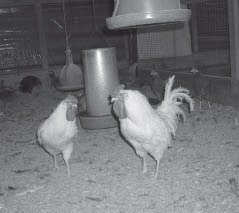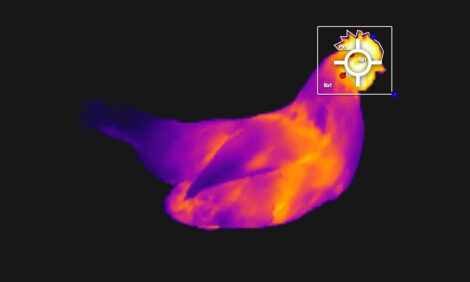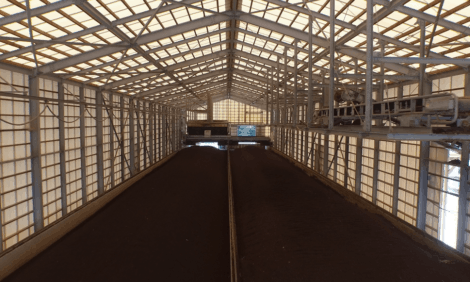



Surveillance Program for Exotic Newcastle Disease and Avian Influenza
By F. Dustan Clark, Extension Poultry Health Veterinarian at the University of Arkansas's Avian Advice - In the last few years there have been several outbreaks of foreign poultry diseases in the United States. An outbreak of low pathogenic Avian Influenza in Virginia in 2002 resulted in the destruction of over 4 million birds. The outbreak cost the Virginia poultry industry approximately $130 million in lost revenue.| The Author | |
 Dr. Dustan Clark Extension Poultry Health Veterinarian |
|
Background
Eradication and indemnity costs associated with this outbreak were
in excess of $60 million. On October 1, 2002, Exotic Newcastle
disease (END) was confirmed in backyard poultry and gamefowl
in southern California. The disease spread to commercial chicken
flocks as well as numerous other backyard, hobby, gamefowl, and
exhibition flocks, resulting in over 18,000 premises being
quarantined in California.
In addition, infected flocks were
detected in Nevada, Texas and Arizona resulting in quarantines in
those states. The cost of eradicating the disease was over $300
million and the associated industry export losses are still being
calculated. 2004 Avian Influenza (AI) outbreaks in Texas,
Maryland, Pennsylvania, Delaware and New Jersey were not as
costly as the 2002 Virginia outbreak, but resulted in quarantines,
bird eradication, and monetary losses.
Project Funding
In late 2003 the United States Department of Agriculture (USDA) made available money
to poultry producing states to assist with foreign poultry disease prevention and detection. This
money was, in part, a result of the outbreaks of END and AI. States could obtain the money by
submitting proposals outlining efforts in the state to promote Biosecurity and detect END and
AI.
The Arkansas State Veterinarian and Arkansas Cooperative Extension Service Poultry
Health Veterinarian developed a proposal that was funded by USDA. The program is a
cooperative effort between the Arkansas Livestock and Poultry Commission (ALPC) and the
Arkansas Cooperative Extension Service aimed at educating backyard, hobby and exhibition
flock owners about disease prevention as well as a surveillance effort for END and AI..
Project Goals
The purpose of the program is to educate individuals on the threat of diseases and how to implement various Biosecurity measures to prevent diseases in their poultry flock. In addition, the program will test the non-commercial flocks of those who request testing to demonstrate that diseases are not silently lurking in the state of Arkansas.
Educational Efforts
 Any person in the state of Arkansas who has a hobby,
exhibition, backyard, or gamefowl chicken flock can
participate in the project free of charge. The educational
portion of the project consists of seminars for flock owners
covering the importance of Biosecurity, disease recognition,
and Biosecurity measures to prevent disease. The seminar
covers various diseases (including END and AI) and also
describes the surveillance portion of program.
Any person in the state of Arkansas who has a hobby,
exhibition, backyard, or gamefowl chicken flock can
participate in the project free of charge. The educational
portion of the project consists of seminars for flock owners
covering the importance of Biosecurity, disease recognition,
and Biosecurity measures to prevent disease. The seminar
covers various diseases (including END and AI) and also
describes the surveillance portion of program.
Fact sheets and
pamphlets are distributed at the seminar and county agents are
encouraged to visit flock owners to document the number and
type(s) of birds owned. Data obtained from these visits
provide a better understanding of the types of birds in a county
so that effective educational materials can be developed. The
survey data also provides county agents with the tools needed
to alert flock owners about disease threats in the area and
ensure that preventative measures are in place.
In addition to the seminar presentations, the program
provides educational materials to ALPC inspectors for
distribution to poultry owners who sell birds at the various
trade days, auctions, flea markets, and swap meets. Inspectors
are also available to make farm visits.
Disease Surveillance
The program also includes actual testing of birds for
Exotic Newcastle (END) and Avian Influenza (AI). Flock
owners who participate in the program and have their birds
tested are provided with New Castle vaccine free of charge.
If a flock owner decides to have birds tested, the county
agent or a livestock inspector takes samples for testing. The
samples taken are vent (also called a cloacal or rectal) swabs.
A metal band is placed on the leg of the chicken and the
number of the band is written on the sample. The band is for
bird identification only and can be removed after the test
results are reported. The collected swabs are refrigerated and
immediately transported to the Arkansas Livestock and
Poultry Commission in Little Rock for testing. The swabs are
tested for only two diseases (END and AI) and the PCR test
(Polymerase Chain Reaction) used is extremely specific for
those diseases. Once the testing is completed, a letter is sent to
the owner documenting the results. The letter can be taken to
the office of the county agent and Newcastle vaccine can be
obtained. This vaccine is for the type of Newcastle regularly
encountered in the United States, not for Exotic Newcastle.
However, it was shown in the California END outbreak that
birds vaccinated with similar vaccines had less mortality than
non-vaccinated birds.
Expected Results and Assistance
Since there have been no reports of high mortality in flocks in Arkansas or surrounding areas, samples are not expected to be positive for either END or AI and to date all samples have been negative. Nevertheless, the Arkansas Livestock and Poultry Commission diagnostic laboratories at Little Rock and Springdale currently offer routine diagnostic services free of charge for any hobby, exhibition, or backyard flock that has lost birds.
Program Future
Currently, the grant funding this program will expire the end of December 2004. Anyone wishing to participate in the survey, testing program, or wanting information should contact their county agent, area livestock inspector or the extension poultry veterinarian. Any person or group that wishes to have an educational seminar on disease recognition (including Exotic Newcastle and Avian Influenza), Biosecurity measures to prevent disease, and what it takes to participate in the surveillance program should contact their county agent or the extension poultry veterinarian.
Protecting Flocks from Disease with Basic Biosecurity Practices
The best way to reduce the risk of introducing the
disease into your birds is by following Biosecurity practices
(Additional information on Biosecurity is available at
http://
www.uark.edu/depts/posc/avianindex.html).
Some examples
of such practices are:
Do not purchase birds that appear sick or that may have been illegally brought into the country.
Avoid sick birds if at all possible.
Practice good hygiene principles.
Clean and disinfect thoroughly.
Do not visit aviaries that have sick birds.
Prevent rodents and wild birds from entering the facilities where birds are kept.
If you visit a facility with birds that may be suspected of being infected it is important to change clothes, shower, wash your hands and thoroughly disinfect all items taken on the premise before contact with your birds.
Report signs of disease immediately and get a veterinary diagnosis immediately.

Source: Avian Advice - Winter 2004 - Volume 6, Number 2








